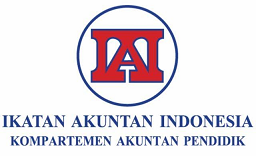DAMPAK TEKNOLOGI INFORMASI PADA PERCIEVED USEFULNESS DARI PENGAMBILAN KEPUTUSAN
Abstract
The preparation of regional budgets is influenced by many factors, so the decision-making must be careful and thorough and supported by adequate data sources. However, human resources also have limitations in storing and remembering the data needed for making budgetary decisions. The preparation of government financial statements currently uses the accrual basis, so that more and more data will be available. Information technology support can reduce the gap between the capabilities of human resources and the demands of budget decisions. This study aims to examine and analyze the effect of information technology support on the perceived usefulness of decision making and its implications for the quality of accrual-based accounting. The object of this research is the government of Lampung Province. The population used is the entire Lampung Provincial Government, while the sample used in this study is the Lampung Provincial Government SKPD. The data was obtained through the distribution of questionnaires to the respondents, namely the SKPD of the Lampung Provincial Government. The data was analyzed using structural equation modeling (SEM) with Lisrel software. This study uses primary data by using a questionnaire as a research instrument. The output of this research is expected to be published in Scopus indexed international journals or national journals (SINTA-3) and the results of this study are expected to be taken into consideration by the government in improving its regional financial performance and realizing financial management accountability in government in Indonesia.
Downloads
References
Bellanca, Sabrina; Loredana Cultera; Guillaume Vermeylen. Analysis of
Public Accounting Systems in the European Union. Journal of research in World Economy. Vol.6, No.3; 2015. http://rwe.sciedupress.com.
Davis, F. D. 1989. Perceived Usefulness, Perceived Ease of Use, and User Acceptance of Information Technology. MIS Quarterly , 13 (3), 319-340.
Davis, F. D., Bagozzi, R. P., & Warshaw, P. R. 1989. User Acceptance of Computer Technology: A Comparison of Two Theoretical Models. Management Science , 35 (8), 982-1003.
DioGuardi, Joseph J. The Journal of Government Financial Management; Spring2014; 63;1;ABI/INFORM Complete pg.44.
Hamisi, K. 2010. The Factors Affecting The Implementation of International Public Sector Accounting Standards in Kenya. College of Humanities and Social Sciences (CHSS) (18312).
Hladika, Nirjana; Vesna Vasicek; Martina Draguja. 2012. Challenges in Managemnet the Transition from Cash to Accrual Accounting in the Public Sector.
Jackson, Sawyers and Jenkin. 2009. Managerial Accounting , A Focus on Ethical Decision Making. 5th edition. Cengage Learning.
Khan, Abdul; and Stephen Mayes. 2009. Technical Notes and Manuals Transition To Accrual Accounting.
Lungu, Ion. 2005. Executive Information Systems. Journal of Revista Informatica Economica.
Mehrolhassani et.all. 2015. Implementation Status of Accrual Accounting System in Health Sector. Global Journal of Health Science. ISSN 1916-9736.
Meyer, John W. and Rowan, Brian. 1977. ‘Institutionalized Organizations: Formal Structure as Myth and Ceremony’. American journal of sociology 83: 340– 363. Mohammadi , Saman dan Razi. 2012. Implementation of Full Accrual Basis in Governmental Organizations (Case Study: Shiraz University of Technology,
Iran). Interdisciplinary Journal of Contemporary Research in Business Institute of Interdisciplinary Business Research 28 7 JUNE 2012 VOL 4, NO 2
Negara, I Gusti Bagus Surya. 2015. Toward Implementation of Accrual Basisi Indonesia Government: Key Success Factor. GSTF Journal on Business Review (GBR) Vo. 4 No. 1 July. 2015.
O’ Brien, James A. 2004. Management Information Systems: Managing Information Technology in The Business Enterprise. Edition USA: Richard.
Ouda, Hassan A.G. 2010. A Prescriptive Model of the Transition to Accrual Accounting in Central Government. International Journal on Governmenalof Financial management. Vol. X no. 1 p.63-94.
Salusu J. 1996. Pengambilan Keputusan Stratejik untuk Organisasi Publik dan Organisasi Nonprofit, Grasindo Widiasarana Indonesia, Jakarta.
Scott, W.R. Institutional Theory: Contributing to a Theoritical Research Program‟, in
K.G. Smith, dan M.A. Hitt (Eds.): Great Minds in Management: The Process of Theory Development (Oxford University Press).
Thomson, Ronald &William Cats Baril .2003:4. Information Technology and Management. 2nd edition. USA:Mc.Graw-Hill.
Tickell, Geofry. 2010. Cash To Accrual Accounting: One Nation’s Dilemma. The International Business & Economics Research Journal; November 2010. Volume 9, Number 11.
Wilkinson, Joseph W. Cerullo, Michael J. Raval, Vasant & Bernard, Wong-on- Wing. 2000. Accounting Information Systems – Essential Concepts and Applications. 4th edition. John Wiley. USA.

This work is licensed under a Creative Commons Attribution-NonCommercial-ShareAlike 4.0 International License.
Jurnal Akutansi dan Keuangan allows readers to read, download, copy, distribute, print, search, or link to the full texts of its articles and allow readers to use them for any other lawful purpose. The journal allows the author(s) to hold the copyright without restrictions. Finally, the journal allows the author(s) to retain publishing rights without restrictions
Authors are allowed to archive their submitted article in an open access repository
Authors are allowed to archive the final published article in an open access repository with an acknowledgment of its initial publication in this journal







